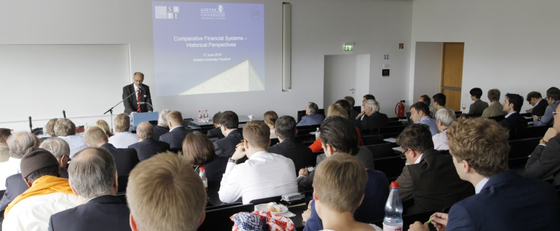
While institutional and regulatory conditions change over time, human behavior does not. Therefore, studying historical events and long-run financial trends provides highly informative and instructive insights also with respect to current developments. Based on this conviction, Goethe University hosted a conference on “Comparative Financial Systems – Historical Perspectives” on 17 June 2016. The conference was jointly organized by Goethe University’s House of Finance, the Research Center SAFE and the Institute for Banking and Financial History in the context of the Visiting Professorship of Financial History, endowed by Metzler Bank and Edmond de Rothschild Group.
Introductory remarks were given by Raimond Maurer, Dean of Goethe University’s Faculty of Economics and Business Administration, and Michael Klaus, Partner at Metzler Bank, who announced the objective to work towards a transformation of the visiting professorship, which has been granted for three years, into a permanent professorship.
 In her keynote speech, this year’s Visiting Professor of Financial History, Caroline Fohlin (Emory University), stressed that people tend to think in dichotomies when comparing financial systems: bank-dominated versus market-dominated systems, or systems where universal banks prevail versus those predominated by specialized banks. History shows however that these dichotomies are not so strict; many economies were and are characterized by mixed forms. The main predictor of a country’s modern banking structure is the respective structure at the start of the 20th century, Fohlin explained. For example, moderately wealthy countries in 1900 as well as countries with historically centralized governments tend to have universal banks and to be less market oriented today. Also, legal traditions correlate with both market orientation and banking type. However, financial system design and legal traditions cannot explain cross-country growth differences over the last 100 years or more, according to Fohlin.
In her keynote speech, this year’s Visiting Professor of Financial History, Caroline Fohlin (Emory University), stressed that people tend to think in dichotomies when comparing financial systems: bank-dominated versus market-dominated systems, or systems where universal banks prevail versus those predominated by specialized banks. History shows however that these dichotomies are not so strict; many economies were and are characterized by mixed forms. The main predictor of a country’s modern banking structure is the respective structure at the start of the 20th century, Fohlin explained. For example, moderately wealthy countries in 1900 as well as countries with historically centralized governments tend to have universal banks and to be less market oriented today. Also, legal traditions correlate with both market orientation and banking type. However, financial system design and legal traditions cannot explain cross-country growth differences over the last 100 years or more, according to Fohlin.
 Moritz Schularick, Professor of Economics at the University of Bonn, focused on changes in the global financial system that makes it more vulnerable to crises. He showed, based on a newly constructed dataset comprising 17 advanced economies in the period of 1870 to 2012, that household debt, especially mortgage lending, has increased tremendously since the 1970s. The reasons are that more people borrow to buy houses (ownership effect), people buy more expensive houses due to heavily increased land prices (price effect) and people borrow more against house value (leverage effect). Correspondingly, the share of mortgage lending in banks’ balance sheets nearly doubled from the 1960s to the 2000s. Although the outbreak of the financial crisis in 2007 brought this increase to a halt, mortgage lending still remains at an all-time high. Schularick emphasized the ensuing risk by citing a long-run study of his which reveals that, although house price bubbles are less frequent than equity bubbles, they more often end up in financial crises and, especially when fueled by credit, lead to particularly deep recessions and slow recoveries.
Moritz Schularick, Professor of Economics at the University of Bonn, focused on changes in the global financial system that makes it more vulnerable to crises. He showed, based on a newly constructed dataset comprising 17 advanced economies in the period of 1870 to 2012, that household debt, especially mortgage lending, has increased tremendously since the 1970s. The reasons are that more people borrow to buy houses (ownership effect), people buy more expensive houses due to heavily increased land prices (price effect) and people borrow more against house value (leverage effect). Correspondingly, the share of mortgage lending in banks’ balance sheets nearly doubled from the 1960s to the 2000s. Although the outbreak of the financial crisis in 2007 brought this increase to a halt, mortgage lending still remains at an all-time high. Schularick emphasized the ensuing risk by citing a long-run study of his which reveals that, although house price bubbles are less frequent than equity bubbles, they more often end up in financial crises and, especially when fueled by credit, lead to particularly deep recessions and slow recoveries.
 Thomas Gehrig, Professor of Finance at the University of Vienna, concentrated on the quality of financial markets over time as regards information aggregation and price discovery. As main sources of mispricing he named herding behavior, speculation, manipulation and illiquidity. With respect to the creation of systemic risk, fragmentation and opacity were mainly responsible for contagion effects on markets, he said. By comparing today’s MDax with the Berlin stock exchange between 1880 and 1910, Gehrig showed that transaction costs were significantly lower back then. The relative impact of information however has remained constant over time – despite all the technological and regulatory advances. Nevertheless, regulation was not a fruitless task, Gehrig said. The most impressive change occurred in market participation which has increased enormously over the last century. In Gehrig’s view, regulation could be very effective with respect to market participation.
Thomas Gehrig, Professor of Finance at the University of Vienna, concentrated on the quality of financial markets over time as regards information aggregation and price discovery. As main sources of mispricing he named herding behavior, speculation, manipulation and illiquidity. With respect to the creation of systemic risk, fragmentation and opacity were mainly responsible for contagion effects on markets, he said. By comparing today’s MDax with the Berlin stock exchange between 1880 and 1910, Gehrig showed that transaction costs were significantly lower back then. The relative impact of information however has remained constant over time – despite all the technological and regulatory advances. Nevertheless, regulation was not a fruitless task, Gehrig said. The most impressive change occurred in market participation which has increased enormously over the last century. In Gehrig’s view, regulation could be very effective with respect to market participation.
 Iain Hardie, Senior Lecturer in International Relations at the University of Edinburgh, came back on the dichotomy between bank-based and market-based financial systems. While, overall, securities markets increased in size more than bank assets, a bank disintermediation did not take place, he said. In a number of countries (Canada, France, Greece, Italy, Netherlands, UK) companies increasingly relied on bank lending in the period of 2000 to 2007, and a range of countries of different system types became more bank-based in this time, Hardie showed. At the same time, the financial system has changed a lot, he stated. Traditional banking is being more and more challenged by market-based banking, offered by traditional but also by “parallel banks”, more commonly referred to as shadow banks. According to Hardie, regulators have pushed against market-based banking by demanding higher capital requirements but, more recently, they have also recognized the need to support the development, for example, by making an effort to restart securitization.
Iain Hardie, Senior Lecturer in International Relations at the University of Edinburgh, came back on the dichotomy between bank-based and market-based financial systems. While, overall, securities markets increased in size more than bank assets, a bank disintermediation did not take place, he said. In a number of countries (Canada, France, Greece, Italy, Netherlands, UK) companies increasingly relied on bank lending in the period of 2000 to 2007, and a range of countries of different system types became more bank-based in this time, Hardie showed. At the same time, the financial system has changed a lot, he stated. Traditional banking is being more and more challenged by market-based banking, offered by traditional but also by “parallel banks”, more commonly referred to as shadow banks. According to Hardie, regulators have pushed against market-based banking by demanding higher capital requirements but, more recently, they have also recognized the need to support the development, for example, by making an effort to restart securitization.
In the ensuing panel discussion, which was moderated by Reinhard H. Schmidt, the speakers returned to the question of what and how to learn from financial history. According to Caroline Fohlin, it is more common among researchers in Europe to consider historical events whereas in the U.S. people do not pay very much attention to history. She warned however that there can also be an “over-learning” from history by pointing to the excessive references to the Great Depression of the 1930s in the U.S. whose counterpart in Germany is the hyperinflation in the 1920s. According to Ian Hardie an important long-term lesson fro history is that, despite all regulatory efforts, people make mistakes. No matter how good the breaks and tires are, he said, if you let people drive fast, accidents will happen. This has to be considered when longing for profits as fruits of free markets, Hardie demanded. The question of how to improve the importance and acceptance of historical research within economics and of how to raise interest among students for historical connections was not answered in the end despite lively discussion with the audience.

Download the conference presentations:

